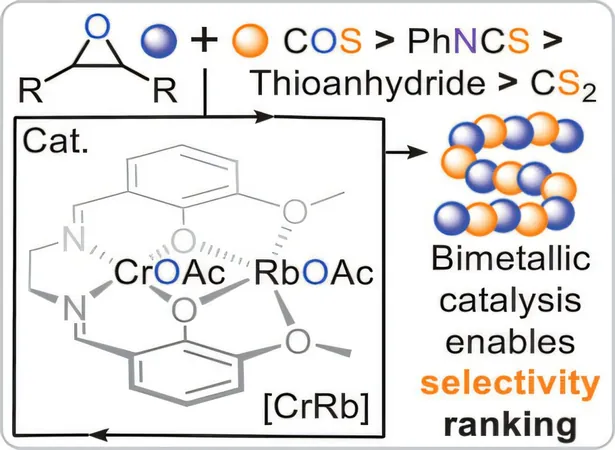
Unlocking Sustainable Plastics: The Power of Sulfur-Based Building Blocks!
2025-09-01
Author: Mei
Plastics are wreaking havoc on our planet with their notorious inability to degrade, leading to an avalanche of waste. As the world ramps up the call for eco-friendly solutions, researchers are racing against time to develop plastics that not only retain their essential properties but are also designed to break down or recycle easily. The breakthrough in this quest could revolutionize how we use plastic, ensuring long-term resource conservation.
A recent study in *Angewandte Chemie International Edition* highlights the transformative potential of incorporating sulfur atoms into polymer chains. Why sulfur, you ask? It turns out that the bond between carbon and sulfur is much weaker compared to the bonds formed with carbon or oxygen, making these sulfur-enriched plastics far easier to degrade under less severe conditions.
However, the journey to mass-produce these innovative plastics has hit some bumps along the way, primarily due to the underdeveloped methods for synthesizing them. But hope is on the horizon!
An international collaborative team, featuring researchers from Martin Luther University Halle-Wittenberg, Texas A&M University, and the University of Bayreuth, has unveiled a groundbreaking method to evaluate various sulfur-based building blocks for plastic production. This could be the game-changer the industry desperately needs!
Prof. Dr. Alex J. Plajer, a Junior Professor of Macromolecular Chemistry at the University of Bayreuth, shares, "Our study has produced a predictive rule that indicates which sulfur-based options yield the strongest and cleanest polymers. This is a massive leap forward!"
Previously, researchers had to painstakingly customize building blocks and conditions for each individual sulfur-plastic combination, making the process intricate and time-consuming.
"Now, armed with our new method, we’ve pinpointed carbonyl sulfide as a star player for plastic production," Plajer states. This remarkable sulfur-based building block reacts consistently to produce long, uniformly structured polymer chains. Even better, it achieves this with minimal catalyst usage and generates very few unwanted by-products.
With these groundbreaking findings, the groundwork is being laid for new, sustainable materials that can be intentionally broken down. The future of plastics might just be redesigned in a more eco-friendly way!
 Brasil (PT)
Brasil (PT)
 Canada (EN)
Canada (EN)
 Chile (ES)
Chile (ES)
 Česko (CS)
Česko (CS)
 대한민국 (KO)
대한민국 (KO)
 España (ES)
España (ES)
 France (FR)
France (FR)
 Hong Kong (EN)
Hong Kong (EN)
 Italia (IT)
Italia (IT)
 日本 (JA)
日本 (JA)
 Magyarország (HU)
Magyarország (HU)
 Norge (NO)
Norge (NO)
 Polska (PL)
Polska (PL)
 Schweiz (DE)
Schweiz (DE)
 Singapore (EN)
Singapore (EN)
 Sverige (SV)
Sverige (SV)
 Suomi (FI)
Suomi (FI)
 Türkiye (TR)
Türkiye (TR)
 الإمارات العربية المتحدة (AR)
الإمارات العربية المتحدة (AR)